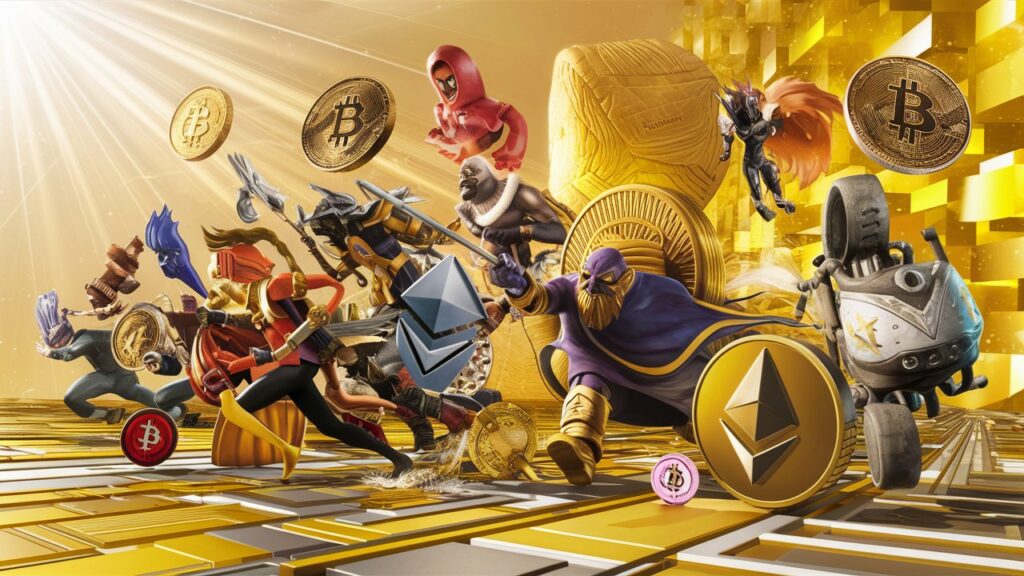Crypto Games: A Beginner’s Guide
In the realm of digital entertainment, cryptocurrencies have emerged as a revolutionary force, fundamentally altering not just the financial world but also the gaming industry. The term „crypto games“ refers to a new era of video games based on blockchain technology. These games use cryptocurrencies and blockchain to create unique game mechanics and economic systems that are not found in traditional online games. In this article, we will explore the basics of crypto games, how they work, and why they are becoming increasingly popular.
What Are Crypto Games?
Crypto games are games that utilize blockchain technology to tokenize game content such as items, characters, or land into digital assets that can be stored and traded on the blockchain. These digital assets are often known as Non-Fungible Tokens (NFTs), meaning they are unique and not interchangeable. Unlike traditional games where all items and progress are owned by the game developers, crypto games offer players real ownership of their digital items. This ownership is secure and verifiable through the blockchain.
How Do Crypto Games Work?
The workings of crypto games are fascinating and fundamentally different from traditional online games. Here are some core aspects that make these games unique:
True Ownership
In traditional games, you can collect numerous items or build up characters, but the ownership is often illusory. In crypto games, however, you have full control over your digital assets. You can freely sell, trade, or transfer them to other games, provided they support the same blockchain.
Decentralization
Using blockchain technology, crypto games are typically decentralized. This means they are not controlled by a single entity. This decentralization can lead to a more transparent and fair gaming environment, as the rules and transactions on the blockchain are visible to everyone and cannot be manipulated.
Earning Potential
Another attractive feature of crypto games is the potential to earn money through gameplay. This is done through mechanisms like „Play-to-Earn,“ where players earn cryptocurrencies or NFTs by completing tasks or competitions in the game. Examples of such games include „Axie Infinity“ and „Decentraland,“ where players are rewarded for their interactions and contributions to the game world.
Why Are Crypto Games Popular?
The popularity of crypto games is growing for several reasons. Firstly, they offer a new form of interaction and ownership in the digital world. Players are not just consumers; they are also investors and owners in the games they play. Secondly, they provide a platform for innovation in game development, as blockchain enables new types of game mechanics and experiences.
Additionally, the games allow for a new form of social and economic interaction. Players can form communities, create markets, and even participate in the governance of the game. This level of involvement and control is rare in traditional games.
Play-to-Earn Models in Crypto Games
The Play-to-Earn (P2E) model is a groundbreaking aspect of crypto games that enables players to earn real money or cryptocurrencies as they engage with the game. Unlike traditional gaming where the financial flow is mostly one-directional—players spending money to play or buy in-game items—P2E models create an economic loop where players can generate income.
How It Works
In a P2E game, players earn digital assets, whether they are tokens, in-game currency, or NFTs, by participating in game activities such as battles, quests, or farming. These assets have real-world value and can be traded on various cryptocurrency exchanges or NFT marketplaces. For example, in „Axie Infinity,“ players breed, raise, and battle creatures called Axies, earning SLP (Smooth Love Potion) tokens that can be sold for cryptocurrencies.
Benefits
The P2E model has democratized the gaming industry by making it accessible for people to earn an income by playing games, especially in developing countries. It also promotes a more engaged and sustained player base as the economic incentives encourage long-term participation.
Challenges
However, the model faces challenges, including the sustainability of earnings as market dynamics change, and the potential for significant impacts on traditional gameplay enjoyment due to the focus on earning rather than purely on entertainment.
Security Aspects
Security is a paramount concern in crypto games because players invest significant amounts of real money into digital assets.
Key Security Features
Blockchain technology inherently offers some level of security through its decentralized and immutable ledger. Transactions and ownership of digital assets in crypto games are transparent and can be verified on the blockchain, which helps prevent fraud.
Potential Risks
Despite the security features, risks such as hacking, phishing attacks, and smart contract vulnerabilities exist. Players need to be vigilant and ensure they use secure wallets, strong passwords, and are aware of security practices.
Solutions
Developers continuously work on improving the security protocols and mechanisms within the games and the underlying blockchain technology to safeguard players‘ assets.
The Future of Crypto Games and Their Impact on the Traditional Gaming Industry
Crypto games are still in their infancy but are poised to have a significant impact on the gaming industry.
Potential Developments
We can expect further integration of blockchain technology in traditional gaming to utilize benefits like verifiable scarcity of items and true ownership. Moreover, as technology evolves, new genres of games could emerge, blending traditional gaming elements with innovative blockchain functionalities.
Industry Impact
Crypto games challenge traditional business models by offering alternative revenue streams and ways to monetize content for developers. This could lead to a shift in how games are designed, developed, and monetized.
Cultural Shift
As more players become accustomed to owning their digital assets and earning from them, we might see a shift in player expectations and demands from gaming platforms and developers.
Conclusion
Crypto games are revolutionizing the way we think about games and digital ownership. They enable players to gain real ownership rights over their digital assets and participate in exciting new economic ecosystems. For many, this is an enticing combination of entertainment and investment.

